Best Dog Food for Labs: Top 6 Picks for Your Labrador Retriever in 2022
 By Ashley Turner Last Updated January 25, 2022
By Ashley Turner Last Updated January 25, 2022
We independently research and recommend the best products; Learn more here. We may receive commissions on purchases made from our product recommendations.
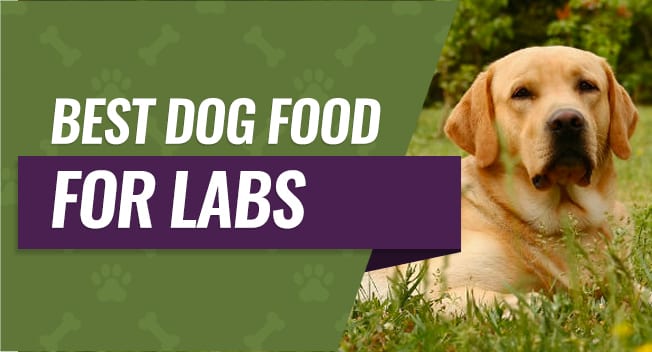
Contents
Just like people, Labs have unique nutritional needs. Lab puppies can grow too fast resulting in future health problems, and adult Labs can tend to be inactive and gain too much weight.
Finding the best dog food for Labs depends on your dog's age, level of activity, overall health, and any sensitivities or allergies they may have. We've put together information you need to find the food that is the best fit for your Labrador Retriever.
Our Top Picks for the Best Dog Foods for Your Lab
| Food | Best for... |
|---|---|
| Blue Buffalo Life Protection Formula | Adults |
| Hill's Science Diet Senior Dog Food | Seniors |
| Wellness Complete Health Natural Dry Dog Food | Puppies |
| Victor Select Hi-Pro Plus Formula | Hunting/Very Active |
| Wellness CORE Reduced Fat Grain Free | Weight Loss |
| Natural Balance Limited Ingredient Diets | Sensitive Stomach |
| Natural Balance Limited Ingredient Diets | Skin Allergies |
Why Do Labrador Retrievers Have Specific Nutrition and Food Needs?
Every breed has its own body type, activity level, and nutritional needs. Labs are no exception.
Labrador Retrievers are medium to large dogs that are part of the AKC's Sporting Group. Adult males will average 65-80 pounds and females will average 55-70 pounds when they are fully-grown.
Labs are enthusiastic, energetic, and require lots of physical activity. They enjoy playing frisbee, go fetch, and swimming, and need food that supports muscle and bone heath.
Their eyes are large and bright, and their coats are dense. Whether their color is yellow, black, or chocolate, Labs need nutrition to keep their skin, eyes, and fur healthy.
Do Labrador Retrievers Tend to Gain Weight?
Even though they are very active, Labrador Retrievers can put on weight. Owners should take care to choose the right food for their dog's age and activity level.
Labs can gain weight easily because of their genetic heritage. They were originally bred in Newfoundland on Canada's north Atlantic Coast, not Labrador.
Labrador Retrievers' dense coat, "otter tail," and sturdy frame helped them swim and hunt during cold Canadian weather. There was little chance the original hunting and working Labs would get too much food or be inactive.
Watch Your Lab Puppy's Growth Carefully
Labrador puppies grow so fast that they may do better on adult food. Watch your Lab puppy's weight and growth chart and feed appropriately to prevent obesity.
Don't Forget to Count Calories and Nutrition in Treats
Do you love to give your Lab treats? Don't forget to take the nutrition and calories in treats into account.
Labradors love to eat. They may easily get into the trash and will be eager to eat what you're having.
They may even try to eat your shoes. The AKC reports that studies have been shown that lean Labs live longer than heavier ones, so it's important to keep an eye on everything your pup eats from dog treats to human food.
Do Labrador Retrievers Have Allergies and Sensitivities?

Labs aren't a breed known for a lot of food sensitivities and allergies, but these problems are growing more common among all breeds. Allergies can show up in puppies as young as four months old.
The most common food allergies in dogs are similar to those found in humans. Corn, soy, and wheat are common grain allergies and sensitivities.
Animal proteins including beef, chicken, fish, and eggs have also caused some allergic reactions in some dogs.
How Can You Tell if Your Labrador Has Food Allergies?
Allergies can affect your dog's digestion, skin, and other organs. Food allergy symptoms include:
- Red, itchy mouth and muzzle.
- Frequent and loose stools (including diarrhea).
- Ear infections.
- Skin irritation or skin infections.
Look for foods which offer hypoallergenic (low allergy) formulas. Low-allergy formulas can substitute less-common proteins including:
- Duck
- Salmon
- Venison
- Turkey
- Bison
Rice can be used in some formulas because it is more digestible than corn, wheat, and soy. Sweet potatoes are another digestible ingredient that causes fewer sensitivities and allergies.
Is Dry Kibble Good for My Labrador Retriever?
Dry kibble is the most common food for dogs. According to the AKC, commercial kibble is tested and ingredients are identified so owners can decide if it offers good nutrition for their dog.
Dogs aren't strict carnivores (meat eaters). They need a variety of ingredients to provide the macro-nutrients they need.
Look for dry kibble that has a complete nutritional profile. Ingredients like peas and sweet potatoes contain nutrients that are safe and healthy for your dog to eat.
Can My Labrador Retriever Eat Human "Superfoods"?
We've heard a lot about "superfoods" for humans like blueberries, kale, and salmon. These foods contain nutrients that benefit our heart, skin, and overall health.
Some human foods are toxic to dogs, including raisins and grapes, chocolate, and onions. The AKC reports that there are some safe and beneficial "superfoods" that benefit your dog:
- Blueberries offer anti-oxidant benefits.
- Cranberries are good for urinary health and contain vitamins C, E, and K.
- Salmon oil could benefit your Lab
What Are Ways to Keep My Labrador Healthy?
Labs are overall a healthy breed according to the American Kennel Club. They can still experience health problems which include:
- Elbow and hip dysplasia (joint disorders).
- Muscle weakness (hereditary myopathy).
- Eye problems (progressive retinal atrophy).
- Exercise induced collapse (EIC).
- Bloat or twisted stomach (Veterinary name: Gastric dilation-volvulus or GDV).
Labrador Retrievers also love to eat and can easily gain too much weight. Obesity is one of the biggest health challenges for Labs and their owners.
Ways to prevent or reduce obesity include:
- The "Show Dog Diet": feed a normal meal in the morning and give a meal of mostly green beans in the evening.
- Exercise every day with your Lab (jogging, walking, and swimming).
- Cut back your dog's food intake
Our Top 6 Picks for the Best Dog Food for Labs
Best for Adults - Blue Buffalo Life Protection Formula
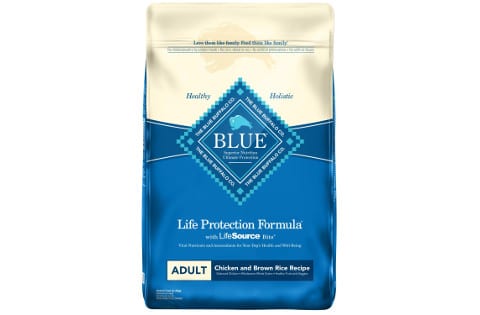
Blue Buffalo's Life Protection formula for large adult dogs has "LifeSource Bits." These ingredients are a blend of vitamins, minerals, and antioxidants chosen by animal nutritionists.
The chicken and brown rice formula of Blue Buffalo's Life Protection formula also contains glucosamine and chondroitin. These ingredients help support your Lab's joint and bone health.
Chicken is the first ingredient. It comes from deboned chicken and chicken meal and is enriched with L-Carnitine.
Blue Buffalo's formula doesn't include any chicken by-products, artificial flavors, or preservatives. It also doesn't include soy, wheat or corn.
If your Lab weighs between 50 and 70 pounds, you should feed them 3 1/4 to 4 1/4 cups a day of this type of food. Add a 1/4 cup for each additional 10 pounds your Lab weighs.
Owners with Labs that had experienced allergic problems with other foods said their dogs improved eating the Blue Buffalo kibble. Some owners with dogs eating less-healthy food successfully switched their dogs to Blue Buffalo.
|
Things We Liked
|
|
Things We Didn't Like
|
Best for Seniors - Hill's Science Diet Senior Dog Food
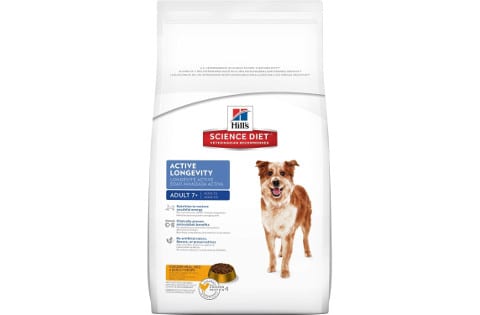
Hill's Science Diet offers several flavors of nutritionally-balanced natural food for senior dogs. Dogs age faster than humans so if your Lab is over age 7 they are a "senior dog."
Hill's Science Diet's Senior formula is all-natural and contains antioxidants that will benefit senior dogs. The food has phytonutrients, L-Carnitine and essential fatty acids.
Protein choices include chicken and beef. Choose between rice-only, rice and barley, and vegetables as additional flavors.
Senior dogs can slow down mentally as well as physically. Science Diet's formula includes ingredients that boost alertness and desire to play.
Science Diet Senior food has a good balance of 19.6% protein and 14.9% fat.
Owners of older Labs that were losing their interest in running and playing said their dogs perked up after being fed Science Diet's Senior formula. Dogs that were slowing down as they approached "senior" age also showed more activity and mobility.
The food does contain chicken, egg, and some corn. If your dog is allergic then the food will not be suitable for them.
|
Things We Liked
|
|
Things We Didn't Like
|
Best for Puppies - Wellness Complete Health Natural Grain Free Dog Food
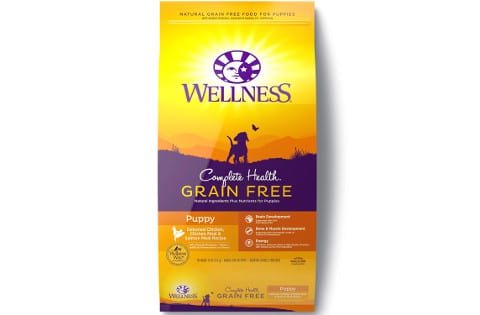
Wellness offers grain-free puppy food that has no fillers, by-products, or preservatives. A puppy's delicate immune system is still developing so grain-free, preservative-free food is essential.
The formula is also balanced between protein, fat, and healthy carbs like sweet potatoes, apples, and blueberries. Vitamins and micronutrients are also designed to support growing puppy bones and muscles.
With their growing digestive systems, puppies can't process protein as well as adult dogs. As a result, the puppy can have gas and diarrhea with a high-protein food.
The protein-fat-carb ratios in Wellness Complete Health's formula are easy on puppy digestion. The formula is balanced between 26.0% protein, 12% fat, and 5.25% fiber.
Some veterinarians recommend feeding Lab puppies adult food because the fat content is too high in some puppy formulas. This isn't the case with Wellness' formula.
Trainers and owners have fed multiple Labrador puppies this formula and report active, happy dogs. Many owners reported their dogs loved the taste, but a few said their dogs didn't like the food.
|
Things We Liked
|
|
Things We Didn't Like
|
Best for Hunting/Very Active Labs - Victor Select Hi-Pro Plus Formula for Active Dogs
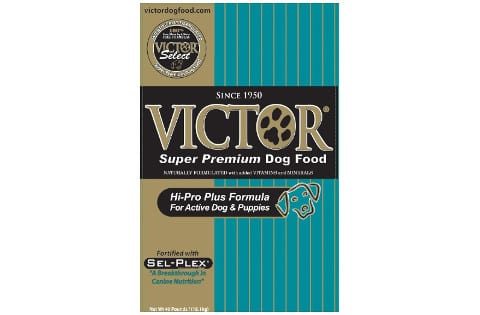
Active dogs need the same level of nutrition as active athletes. With 30% protein from beef, chicken and pork and 20% crude fat, Victor's Super Premium high protein food is a good choice for Labradors that hunt or are extremely active.
Victor's food contains guaranteed amounts of Omega 3 and 6 fatty acids and Vitamin E. The food isn't grain free but it is gluten free.
The food also contains calcium. It has a good ratio of calcium to phosphorus for bone and joint health.
Owners of performance and hunting dogs report their dogs love the taste of the food. Labs of between 50 and 70 pounds should eat 3 to 3 3/4 cups of Victor's Hi-Pro Plus Formula a day.
|
Things We Liked
|
|
Things We Didn't Like
|
Best for Weight Loss - Wellness CORE Natural Reduced Fat Dog Food
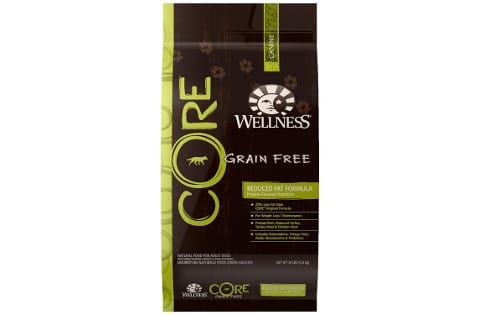
Labs can gain too much weight easily and Wellness Core's Grain Free formula can help them reduce their weight. The brand makes turkey and chicken and ocean whitefish, herring and salmon grain-free flavors.
Grains can lead to allergic reactions and food sensitivities. They can also lead to unwanted weight gain, which is why a grain-free formula helps dogs to lose weight.
A wild game option in Wellness Core's grain free line can also contribute to weight loss. Choosing this reduced fat, higher protein formula can also help maintain a healthy weight.
Older, overweight Labs successfully lost weight and gained energy from eating this food. Dogs fed this food showed improved digestion, energy, and brighter eyes and shinier coats.
|
Things We Liked
|
|
Things We Didn't Like
|
Best for Sensitive Stomachs and Allergies - Natural Balance Limited Ingredient Diets Dry Dog Food
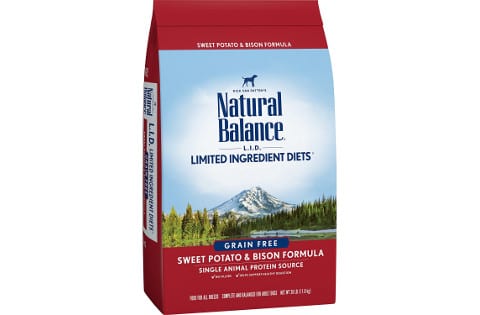
The most common sources of allergies in dogs are wheat, corn, soy, and dairy. Other allergens can include beef and chicken.
Natural Balance's Limited Ingredient Diet (L.I.D.) food doesn't contain any of these items. Bison is a high-protein alternative to beef.
The food also uses sweet potatoes, which are a high-nutrition, low-allergen, digestible food. Using a single protein source, bison, also reduces the potential for an allergic reaction.
This food contains no artificial colors and flavors. Natural Balance conducts safety tests with microbiologists, veterinarians, and chemists.
The food's balance of 20% protein and 10% fat is nutritious and healthy for most Labradors. The formula also has Omega 3 and Omega 6 fatty acids.
Dogs with skin allergies responded well to Natural Balance's formula. Dogs with severe digestive problems also improved after being switched to this food.
|
Things We Liked
|
|
Things We Didn't Like
|
Our Top Pick
Unless your Labrador Retriever is an extremely active working dog or has other special needs, they don't need high-protein food. Considering the tendency for Labradors to put on weight, they also don't need to eat foods that are high in fat.
Even though Labs don't have a lot of allergy problems as compared to some other breeds, the high-allergy grains like wheat and corn are high in calories. There are many dog foods which don't rely on these high-calorie ingredients.
Blue Buffalo's Life Protection Formula has a good nutritional balance between protein and fat. Most Lab owners reported their dogs liked the taste and digested the food well with no allergy problems.
It has glucosamine and chondroitin to support strong joints and bones. It also has vitamins, minerals, and antioxidants added directly into the food.
Unless your Lab has special needs, our choice for the best food for Labs is Blue Buffalo's Life Protection Formula Natural Adult Dry Dog Food.
